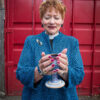Reflections Between Days of Gratitude and Anticipation
It’s the weekend after Thanksgiving. The leftovers have been packed away, distributed to guests, or turned into creative re-inventions like soup. Or in my family’s unusual tradition, used as topping for pizza (yes, put all your leftovers on a pizza crust and bake it like any other pizza).
People have ventured out seeking bargains. Returned to their homes. Gone back to work. Holiday carols are already playing in the background. Maybe we’re even thinking about the new year.
And I’m still reflecting on this poem by Joy Harjo (see below) about how life happens around a common table. It embodies all the messiness of humanity living in connection to each other: ugly and beautiful, sad and sweet, empty and fulfilling. All the savory and unsightful parts of life are served up on tables around which we gather, unwanted or welcomed, voluntarily or forced, hosts or guests.
At the holidays, some folks travel to reach the table. Others stay home. Some extend an invitation, with a sense of wealth and wellbeing measured by connections and resources, enriched by the abundance and capacity to be hosts. Some people come empty-handed to the table, lacking something, whether it’s time or funds or supplies or energy, perhaps feeling vulnerable and uncomfortable. Some do the cooking and serving and come tired to the table. Some make the table beautiful. Some make sure there are enough seats. Some arrive but cannot partake, and remain hungry. Some sit down with others, and eat and drink just enough and feel sated. Some overindulge and pay for it later. Some find other tables. Some dine alone. Some can’t get to the table at all.
Most of the time, it’s comforting to be the ones who invite others to the table. Who have ample amounts to share. Or who feel, if not assured of abundance, as if we have enough to spare. And confident that others will bring more and make it a feast.
When it’s possible, I prefer to be the one who cooks, adapting recipes handed down by loved ones, like retelling old familiar stories together. Admittedly there’s the element of being more comfortable when I can set the meal time, choose the menu, and extend the invitations. Sure, I like the surprise of whatever people bring with them to add to the offerings. And I enjoy the challenge of adding more chairs around a table that really can’t accommodate all of us, because we’re an expansive and unruly gathering. Maybe I worry and wonder if there’s enough food to go around, because I want everyone to be satisfied. Yet when it’s time to eat, I sigh and feel exhausted, with aching feet and a full heart, because people came to our table. And I served them.
By contrast, it can be humbling to be the one who needs a place to go or a source of help. Who asks for food or a place at the table. Or lives as the person who doesn’t ask, doesn’t seek connection, and simply goes without. Who depends on others for food in the belly and a warm safe place to land for a while. A chance to get through another day.
At some time in our lives we will each need a seat at a table that belongs to someone else. It’s happened to me, more than once, for various reasons. It happened when I was a student low on money. Or when I was a stranger, exiled from what I considered to my own home and my familiar life, in an unknown place without kin or connections. And in later years, it occurred when my loved one was struggling with cancer and others brought the holiday to us in the hospital. It’s happened plenty of times.
Of course, let me be honest, I sometimes want to be invited to someone else’s table. Sometimes I appreciate being the guest, maybe put to working chopping and setting the table, or simply asked to sit down and enjoy the gift of hospitality. I savor the respite that comes from being fussed over and cared for. That experience can offer renewal through receiving others’ kindness.
We don’t always get to choose when and where we will find our strength and sustenance. This weekend we’re in the time between. We just dedicated a whole holiday to reflecting on gratitude. As Christians, we’re about to enter the active and vigilant season of Advent. Soon we begin to anticipate the gifts of the Christmas season. We prepare a table for the arrival of an unstoppable love in the form of Emmanuel: Christ With Us.
Yet as I think about it, hasn’t that love been sitting at the table at every meal prepared and served? After all, to whom else does this table belong?
If you haven’t already sampled the delight of poetry this season, I offer you the taste below. May your mouth water for more. And may you be filled, not just by an abundance of food and companionship, but the presence of love and compassion and justice and grace and purpose in your life. May you savor such blessings, whether you serve them to others, receive them from someone else’s hands, or both.
Perhaps the World Ends Here
By Joy Harjo
The world begins at a kitchen table.
No matter what, we must eat to live.
The gifts of earth are brought and prepared, set on the table.
So it has been since creation, and it will go on.
We chase chickens or dogs away from it.
Babies teethe at the corners.
They scrape their knees under it.
It is here that children are given instructions on what it means to be human.
We make men at it, we make women.
At this table we gossip, recall enemies and the ghosts of lovers.
Our dreams drink coffee with us as they put their arms around our children.
They laugh with us at our poor falling-down selves and as we put ourselves back together once again at the table.
This table has been a house in the rain, an umbrella in the sun.
Wars have begun and ended at this table.
It is a place to hide in the shadow of terror.
A place to celebrate the terrible victory.
We have given birth on this table, and have prepared our parents for burial here.
At this table we sing with joy, with sorrow.
We pray of suffering and remorse.
We give thanks.
Perhaps the world will end at the kitchen table, while we are laughing and crying, eating of the last sweet bite.
###






